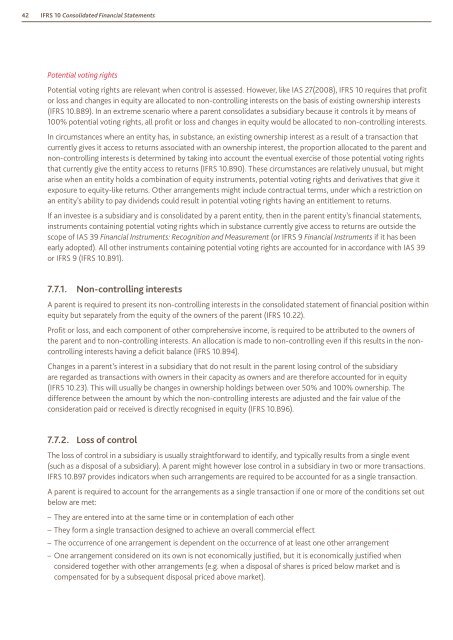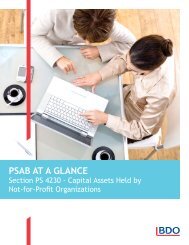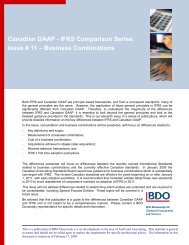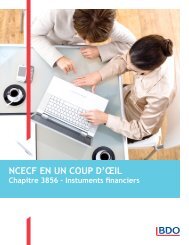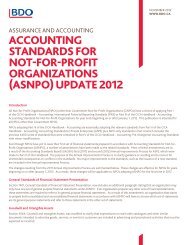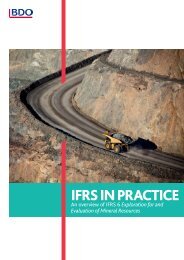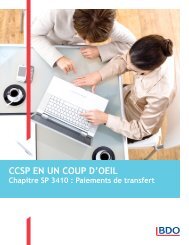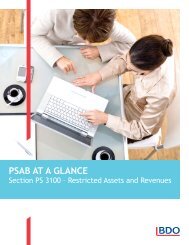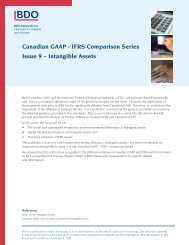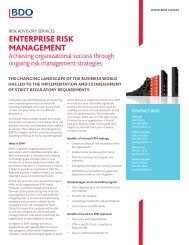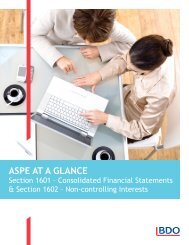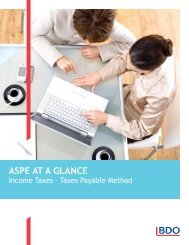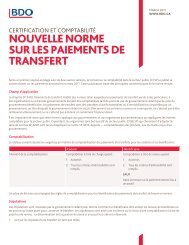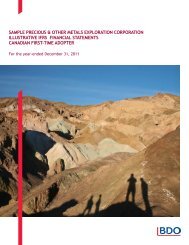Need to Know: IFRS 10 - Consolidated Financial ... - BDO Canada
Need to Know: IFRS 10 - Consolidated Financial ... - BDO Canada
Need to Know: IFRS 10 - Consolidated Financial ... - BDO Canada
- No tags were found...
Create successful ePaper yourself
Turn your PDF publications into a flip-book with our unique Google optimized e-Paper software.
42 <strong>IFRS</strong> <strong>10</strong> <strong>Consolidated</strong> <strong>Financial</strong> StatementsPotential voting rightsPotential voting rights are relevant when control is assessed. However, like IAS 27(2008), <strong>IFRS</strong> <strong>10</strong> requires that profi<strong>to</strong>r loss and changes in equity are allocated <strong>to</strong> non-controlling interests on the basis of existing ownership interests(<strong>IFRS</strong> <strong>10</strong>.B89). In an extreme scenario where a parent consolidates a subsidiary because it controls it by means of<strong>10</strong>0% potential voting rights, all profit or loss and changes in equity would be allocated <strong>to</strong> non-controlling interests.In circumstances where an entity has, in substance, an existing ownership interest as a result of a transaction thatcurrently gives it access <strong>to</strong> returns associated with an ownership interest, the proportion allocated <strong>to</strong> the parent andnon-controlling interests is determined by taking in<strong>to</strong> account the eventual exercise of those potential voting rightsthat currently give the entity access <strong>to</strong> returns (<strong>IFRS</strong> <strong>10</strong>.B90). These circumstances are relatively unusual, but mightarise when an entity holds a combination of equity instruments, potential voting rights and derivatives that give itexposure <strong>to</strong> equity-like returns. Other arrangements might include contractual terms, under which a restriction onan entity’s ability <strong>to</strong> pay dividends could result in potential voting rights having an entitlement <strong>to</strong> returns.If an investee is a subsidiary and is consolidated by a parent entity, then in the parent entity’s financial statements,instruments containing potential voting rights which in substance currently give access <strong>to</strong> returns are outside thescope of IAS 39 <strong>Financial</strong> Instruments: Recognition and Measurement (or <strong>IFRS</strong> 9 <strong>Financial</strong> Instruments if it has beenearly adopted). All other instruments containing potential voting rights are accounted for in accordance with IAS 39or <strong>IFRS</strong> 9 (<strong>IFRS</strong> <strong>10</strong>.B91).7.7.1. Non-controlling interestsA parent is required <strong>to</strong> present its non-controlling interests in the consolidated statement of financial position withinequity but separately from the equity of the owners of the parent (<strong>IFRS</strong> <strong>10</strong>.22).Profit or loss, and each component of other comprehensive income, is required <strong>to</strong> be attributed <strong>to</strong> the owners ofthe parent and <strong>to</strong> non-controlling interests. An allocation is made <strong>to</strong> non-controlling even if this results in the noncontrollinginterests having a deficit balance (<strong>IFRS</strong> <strong>10</strong>.B94).Changes in a parent’s interest in a subsidiary that do not result in the parent losing control of the subsidiaryare regarded as transactions with owners in their capacity as owners and are therefore accounted for in equity(<strong>IFRS</strong> <strong>10</strong>.23). This will usually be changes in ownership holdings between over 50% and <strong>10</strong>0% ownership. Thedifference between the amount by which the non-controlling interests are adjusted and the fair value of theconsideration paid or received is directly recognised in equity (<strong>IFRS</strong> <strong>10</strong>.B96).7.7.2. Loss of controlThe loss of control in a subsidiary is usually straightforward <strong>to</strong> identify, and typically results from a single event(such as a disposal of a subsidiary). A parent might however lose control in a subsidiary in two or more transactions.<strong>IFRS</strong> <strong>10</strong>.B97 provides indica<strong>to</strong>rs when such arrangements are required <strong>to</strong> be accounted for as a single transaction.A parent is required <strong>to</strong> account for the arrangements as a single transaction if one or more of the conditions set outbelow are met:––They are entered in<strong>to</strong> at the same time or in contemplation of each other––They form a single transaction designed <strong>to</strong> achieve an overall commercial effect––The occurrence of one arrangement is dependent on the occurrence of at least one other arrangement––One arrangement considered on its own is not economically justified, but it is economically justified whenconsidered <strong>to</strong>gether with other arrangements (e.g. when a disposal of shares is priced below market and iscompensated for by a subsequent disposal priced above market).


